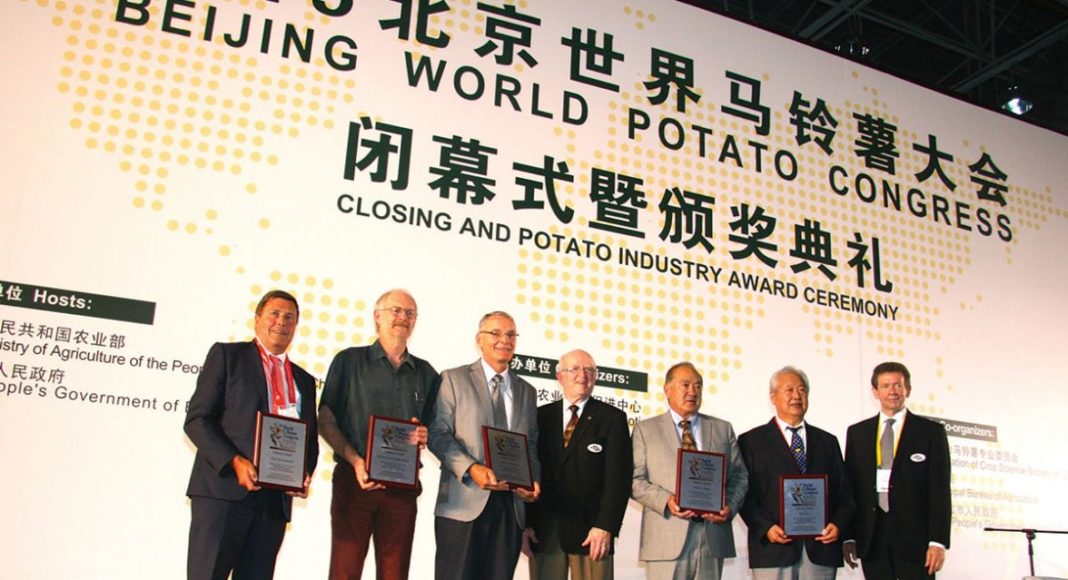[deck]The ninth World Potato Congress in Beijing, China drew hundreds of delegates from more than three dozen countries.[/deck]
The ninth World Potato Congress, staged against the spectacular backdrop of the Great Wall of China, attracted about 900 potato industry stakeholders from 37 countries to Yanqing County just outside Beijing, China from July 28 to 30.
The delegates included growers, researchers, producers, traders, processors and manufacturers from developing and developed nations — with more than half of the attendees coming from the host country itself.
“There was quite of few farmers from China there too, which we thought was great,” says David Thompson, the Canadian president of the WPC who praised the Chinese hosts for helping stage a successful event.
“They went all-out,” says Thompson. “The Congress was excellent. We were very pleased with it.”
It was the second time the triennial event has been held in China since the Congress began in 1993. Back in 2004, it was held in the Chinese city of Kunming. This year’s Congress was held at Beijing Badaling (Great Wall) International Conference and Exhibition Center, a striking complex recently constructed to host events just like the WPC. “The facilities were fantastic,” says Thompson.
The Beijing Badaling Center also hosted the China Potato Expo and the China Potato Congress (which preceded the WPC) at the same time. Chinese officials told Spud Smart prior to the WPC that the event was viewed as a platform to not only showcase potato production in China, but also to share key knowledge and promote co-operation within the global potato industry.
These objectives were clearly met, according to both Thompson and Peter VanderZaag, the noted Canadian potato grower and scientist who’s helped the Chinese develop their potato industry since the 1980s. VanderZaag was at the Congress as a special adviser to the WPC and helped organize the event.
“The Chinese are very keen to interact with foreign scientists and foreign industry people. I think it’s a great place to foster relationships,” he says. “Overall there was a very good ambience … lots of networking going on.”
VanderZaag says Canada was well represented at the Congress. “There was a good contingent from out east and from across Canada,” he says. “I think that China looks at Canada as one of its best friends in helping them progress their potato industry.”
China is already the world’s No. 1 potato producer, growing nearly 100 million tons of potatoes in 2013 according to Chinese government statistics. It’s poised to become an even bigger producer, with the move by Chinese officials earlier this year to begin ramping up domestic production and consumption of potatoes in an effort to ensure food security, ease pressure on the environment and increase farmer incomes. The goal is to make potato a fourth staple food in China behind rice, wheat and corn.
Not surprisingly, the theme of potato as a staple food was front-and-centre during the keynote speeches and technical sessions at the WPC. Several prominent Chinese officials, including China’s vice minister of the Ministry of Agriculture, delivered presentations on the topic. A number of other speakers talked about the potato as a staple food in other parts of the world such as Peru and East Africa.
VanderZaag says a highlight for him was seeing the Chinese being leaders in terms of promoting potatoes as a staple food. “They have a really aggressive strategy for making the potato a bigger part of their food security strategy, in contrast with a lot of countries where it’s a lot of talk,” he says. “The Chinese are doing it.”
In July, it was announced that 10th edition of the triennial World Potato Congress will be hosted by the birthplace of the potato. The designation of Peru as host country in 2018 marks the first time that the Congress will be held in Latin America.
“I wanted to see that happen… so I’m very happy about that,” says VanderZaag.
Thompson agrees it’s good news. He adds it’s interesting to note that while both Canada and Peru produce about the same amount of potatoes annually, far more people make their living at it in the South American country than here. There about 700,000 potato farmers in Peru, compared to 1,200 or so in Canada, he says. For that reason, coupled with the fact it’s being staged in the ancestral home of the potato, Thompson expects the 10th WPC to have quite a unique flavour.
“I know they’re looking forward to inviting the world to come see what they have to offer,” he says. “I expect it to be an excellent Congress there too, and we’re looking forward to it.”
[sidebar]
Where on the Web
Peter VanderZaag, prominent Canadian potato expert and special adviser to the ninth World Potato Congress in Beijing, China, delivered a compelling closing plenary address that analyzed the primary issues brought forward at the Congress. A complete transcript of VanderZaag’s speech is available online at spudsmart.com.
[/sidebar]











